 Writing guest posts, emails and tweets about INCEPTIO, PERFIDITAS, SUCCESSIO and AURELIA, I’ve been asked why I write the titles in capitals. Some bloggers and respondees have written the book names with title case, e.g. Inceptio, Perfiditas and I’ve gently pointed out that it’s not quite correct. Writing guest posts, emails and tweets about INCEPTIO, PERFIDITAS, SUCCESSIO and AURELIA, I’ve been asked why I write the titles in capitals. Some bloggers and respondees have written the book names with title case, e.g. Inceptio, Perfiditas and I’ve gently pointed out that it’s not quite correct.
So here’s the reason…I’m not SHOUTING, but following classical Roman usage. You may have noticed inscriptions on Roman tombs, arches and buildings are always in capitals. So are inscriptions on coins.
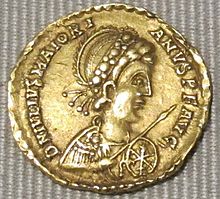 The Romans used just 23 letters to write Latin. There were no lower case letters at first, and K, Y and Z used only for writing words of Greek origin. The letters J, U and W were added to the alphabet at a later stage to write languages other than Latin. J is a variant of I, U is a variant of V, and W was introduced as a ‘double-v’ to make a distinction between the sounds we know as ‘v’ and ‘w’ which was unnecessary in Latin. The Romans used just 23 letters to write Latin. There were no lower case letters at first, and K, Y and Z used only for writing words of Greek origin. The letters J, U and W were added to the alphabet at a later stage to write languages other than Latin. J is a variant of I, U is a variant of V, and W was introduced as a ‘double-v’ to make a distinction between the sounds we know as ‘v’ and ‘w’ which was unnecessary in Latin.
Lowercase letters developed from cursive versions of the uppercase letters:
Old Roman cursive was the everyday form of handwriting used for writing letters (including love letters and dinner invitations), by merchants writing business accounts, by schoolchildren learning the Latin alphabet, and even emperors issuing commands.
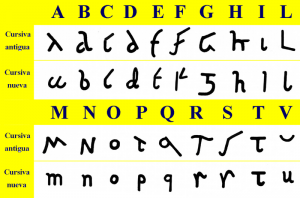 Top row Old Roman cursive, bottom row New Roman cursive A more formal style of writing was based on Roman square capitals, but cursive was used for quicker, informal writing. It was most commonly used from about the 1st century BC to the 3rd century, but it probably existed earlier than that.
New Roman cursive script was in use from the 3rd century to the 7th century, and uses letter forms that are more recognisable to modern eyes; a,b,d and e had taken a more familiar shape, and the other letters were proportionate to each other.
The Vindolanda tablets give specific examples of rare, preserved letters and other documents. Notes on the form of Latin used here and search the documents database here.
Oh, and as my Roma Novans are very proud of their Roman roots, they still follow classical practice of CAPITALS, so it seemed rude not to follow it for my book titles.
Updated 2022: Alison Morton is the author of Roma Nova thrillers – INCEPTIO, CARINA (novella), PERFIDITAS, SUCCESSIO, AURELIA, NEXUS (novella), INSURRECTIO and RETALIO, and ROMA NOVA EXTRA, a collection of short stories. Audiobooks are available for four of the series. Double Identity, a contemporary conspiracy, starts a new series of thrillers. JULIA PRIMA, a new Roma Nova story set in the late 4th century, will be out on 23 August 2022.
Download ‘Welcome to Alison Morton’s Thriller Worlds’, a FREE eBook, as a thank you gift when you sign up to Alison’s monthly email update. You’ll also be among the first to know about news and book progress before everybody else, and take part in giveaways.
If you enjoyed this post, do share it with your friends!Like this:Like Loading...
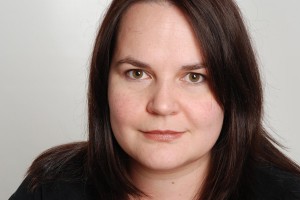 My guest today is Liesel Schwarz, writer extraordinaire of steampunk adventures. Her heroine reminds me a great deal of Karen/Carina: young women who know their minds, courageous and who try to make sense of the different (to us) worlds they live in. A life-long fan of 19th Century Gothic literature, Liesel is a hopeless romantic and loves Victorians, steampunk, fairies, fantasy monsters, the Fin de Siècle, and the correct way to drink absinthe. My guest today is Liesel Schwarz, writer extraordinaire of steampunk adventures. Her heroine reminds me a great deal of Karen/Carina: young women who know their minds, courageous and who try to make sense of the different (to us) worlds they live in. A life-long fan of 19th Century Gothic literature, Liesel is a hopeless romantic and loves Victorians, steampunk, fairies, fantasy monsters, the Fin de Siècle, and the correct way to drink absinthe.
She also likes Medieval stuff, pirates, zombies, space operas and all subjects in between. She has been very busy with her doctorate in English and Creative Writing at Brunel University and her three books in The Chronicles of Light and Shadow series: A Conspiracy of Alchemists, A Clockwork Heart and, this June, Sky Pirates. She lives in London and is definitely a cat person.
Welcome, Liesel! You write in an alternative reality where technology based on steam prevails but social attitudes and values haven’t progressed much beyond in ‘real life’ Victorian society. How have you reconciled the ‘girl’s own adventure’ of your tough protagonist Elle with these values?
I think this was one of the most interesting and challenging parts of writing the series. I think it is impossible to create authenticity when writing within a certain historical context (whether it be alternative reality or not) without having your characters behave as they would have done in accordance with the attitudes and values of the time.
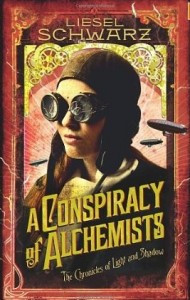 Historical fiction is, in a way, a form of time travel and I think most readers read historical fiction so they can escape to that specific space and time. In a way, the rigid and biased attitudes and values which prevailed in the early 20th century made setting up an adventure story really easy. There was also a precedent for this because there were a surprising number of women from that time who rebelled against the ideals of the time. These women engaged in all manner of professions such archaeology, botany, religious ministry, medicine, artists and many more. At the time, the first proto-feminists were growing the suffragette movement. Women were starting to challenge sexual stereotypes and we see the Bohemian movement and experimentation with all manner of things emerging. All of these ingredients gave me a lot of options that were credible within the historical context and playing with these ideas was great fun. Historical fiction is, in a way, a form of time travel and I think most readers read historical fiction so they can escape to that specific space and time. In a way, the rigid and biased attitudes and values which prevailed in the early 20th century made setting up an adventure story really easy. There was also a precedent for this because there were a surprising number of women from that time who rebelled against the ideals of the time. These women engaged in all manner of professions such archaeology, botany, religious ministry, medicine, artists and many more. At the time, the first proto-feminists were growing the suffragette movement. Women were starting to challenge sexual stereotypes and we see the Bohemian movement and experimentation with all manner of things emerging. All of these ingredients gave me a lot of options that were credible within the historical context and playing with these ideas was great fun.
What has been the most surprising thing – good or bad – on your journey to publication? And during your research?
I think I was just generally surprised by the whole journey to publication. I had hoped it would happen, but I never actually thought I would get published and to this day I still have to pinch myself to make sure it’s not just a figment of my imagination.
I was also quite surprised by the amount of work that goes into producing a book. Things like all the various rounds of edits, cover design and promotion. I don’t think many people actually realize how many hours go into the creation of a book.
I think the manner in which people respond to one’s work is truly surprising. Both good and bad. On the whole, I have been absolutely overwhelmed by positive responses to my work and that is one of the best things ever.
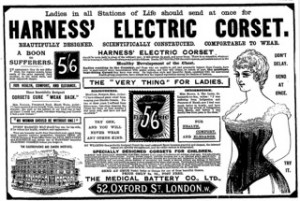 As for my research, I often stumble on things that the Victorians and Edwardians invented. I look at these and think, ‘No way! No one is going to believe that was a real thing if I put it in a book.’ As for my research, I often stumble on things that the Victorians and Edwardians invented. I look at these and think, ‘No way! No one is going to believe that was a real thing if I put it in a book.’
I have to admit that I am quite a fan of Victorian “wellness” technology. Strange miracle tinctures, odd medical accouterments – all of which was invented in a time when things like electricity was still a mystery. I love looking at the old advertisements for those. One of my favourite inventions is an electric corset that apparently assisted with backache.
I’ll go for anything that saves backache!
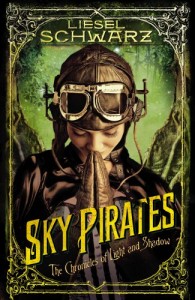 Liesel’s new book, Sky Pirates, the third in The Chronicles of Light and Shadow, is out in June. Here’s a taster… Liesel’s new book, Sky Pirates, the third in The Chronicles of Light and Shadow, is out in June. Here’s a taster…
For Eleanor ‘Elle’ Chance, the last year has been hard. Her husband is lost. Her duty as the Oracle is a blessing and a curse. If it wasn’t for her work, piloting the Water Lily and exploring the world, she would have nothing left to cling on to.
But as a routine cargo mission to the Sudan offers unforeseen opportunities, the council of Warlocks has fallen under the sway of the Shadow Master, and he has plans for the Oracle…
Liesel’s website: http://www.lieselschwarz.com
Alison Morton is the author of Roma Nova thrillers, INCEPTIO, and PERFIDITAS. Third in series, SUCCESSIO, is out early summer 2014.
If you enjoyed this post, do share it with your friends!Like this:Like Loading...
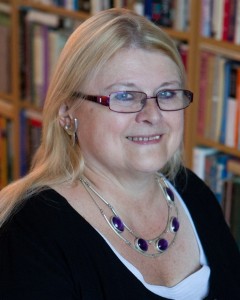 Photo: Jack Ladenburg I’m delighted to welcome my friend Carole Blake to my blog today to give an insight into one of the hottest questions in the publishing today. Carole has just celebrated 50 years in the publishing business, so she probably knows a thing or two. In 1977, after 14 years in publishing, Carole started her own literary agency which merged with Julian Friedmann’s agency to become Blake Friedmann in 1982. She is a past President of the Association of Authors’ Agents and author of From Pitch to Publication, a must-read for any writer wishing to understand the publishing industry. An updated version is due out in 2015.
Welcome, Carole. In the changing publishing world, one question I see debated everywhere, and with enthusiasm, is whether a writer needs an agent in today’s publishing environment.
Yes. And no. Many authors, especially self-published ones, manage everything for themselves now and many do it really well. Many authors are writing in areas that will not attract agents, so they have no choice.
But, of course, I think an agent is only a good thing for a writer: I’ve been an agent for 37 years and I know there are many things we do for our clients that would be difficult for them to accomplish alone.
Handling your own marketing, selling yourself, takes time and a certain kind of personality too. Having an agent represent you gives you a broader spread of influence, a bigger reach, access to many more contacts A good agent fights for you on many fronts and brings their experience to your career. I can’t imagine an author alone, negotiating their contract with a gigantic multi-national conglomerate publisher and getting the concessions that agencies do. An author without an agent simply wouldn’t have experience of enough contracts to know what was achievable. Even Amazon, with their ‘White Glove’ programme, offer agented authors who epublish via them, much higher royalty packages than unagented authors, and access to more promotions.
As publishers are sold, merge, go under, an agent represents stability in an unstable industry; continuity as publishing staff come and go. Agency staff change too, of course, but much less frequently than at publishing houses. Some of my clients have been with me for more than 30 years, yet they all find their editor, publicist or publisher (sometimes all three!) has changed. The market is a jungle. An author alone can’t expect to stay abreast of everything, especially if they are having to devote time to their marketing and are having to sell their own books.
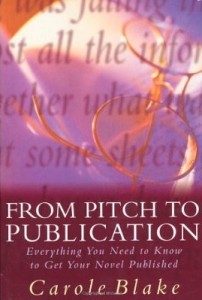 In addition to wide negotiating experience, agencies have staff to sell the rights they withhold from UK publishers: US, translation, film, television, stage, audio being the most common. Every extra strand of income we negotiate for our clients, every new language, every new right, brings more income and a greater visibility for the author. In addition to wide negotiating experience, agencies have staff to sell the rights they withhold from UK publishers: US, translation, film, television, stage, audio being the most common. Every extra strand of income we negotiate for our clients, every new language, every new right, brings more income and a greater visibility for the author.
Agents only get paid when they pay their clients (by law we must have separate client accounts, like lawyers). That certainly focuses the mind! We have a common purpose, and we share together in the successes. And we are there to encourage if things go wrong.
Many of my authors are published in more than 30 languages. That means that every time they deliver a manuscript I can anticipate selling it over and over again, without the writer having to do any more work. My agency has a network of overseas agencies that sell our list, and we have staff who deal with publishers around the world. Our preparation for international book fairs is military-like in its precision. My staff and I bring our decades of experience to bear on the work of the authors we represent, and take a huge satisfaction in presenting them with multiple deals over a range of formats and languages.
Thank you, Carole, for such a clear explanation for the readers. I’m looking forward to your update of From Pitch to Publication next year.
Alison Morton is the author of Roma Nova thrillers, INCEPTIO, and PERFIDITAS. Third in series, SUCCESSIO, is now out.
Find out about Roma Nova news, writing tips and info by signing up for my free monthly email newsletter.
If you enjoyed this post, do share it with your friends!Like this:Like Loading...
|
Subscribe to Blog via Email
Join 37 other subscribers.
Buy AURELIA from Apple!
UK

US

|
 Writing guest posts, emails and tweets about INCEPTIO, PERFIDITAS, SUCCESSIO and AURELIA, I’ve been asked why I write the titles in capitals. Some bloggers and respondees have written the book names with title case, e.g. Inceptio, Perfiditas and I’ve gently pointed out that it’s not quite correct.
Writing guest posts, emails and tweets about INCEPTIO, PERFIDITAS, SUCCESSIO and AURELIA, I’ve been asked why I write the titles in capitals. Some bloggers and respondees have written the book names with title case, e.g. Inceptio, Perfiditas and I’ve gently pointed out that it’s not quite correct. The Romans used just 23 letters to write Latin. There were no lower case letters at first, and K, Y and Z used only for writing words of Greek origin. The letters J, U and W were added to the alphabet at a later stage to write languages other than Latin. J is a variant of I, U is a variant of V, and W was introduced as a ‘double-v’ to make a distinction between the sounds we know as ‘v’ and ‘w’ which was unnecessary in Latin.
The Romans used just 23 letters to write Latin. There were no lower case letters at first, and K, Y and Z used only for writing words of Greek origin. The letters J, U and W were added to the alphabet at a later stage to write languages other than Latin. J is a variant of I, U is a variant of V, and W was introduced as a ‘double-v’ to make a distinction between the sounds we know as ‘v’ and ‘w’ which was unnecessary in Latin.
















